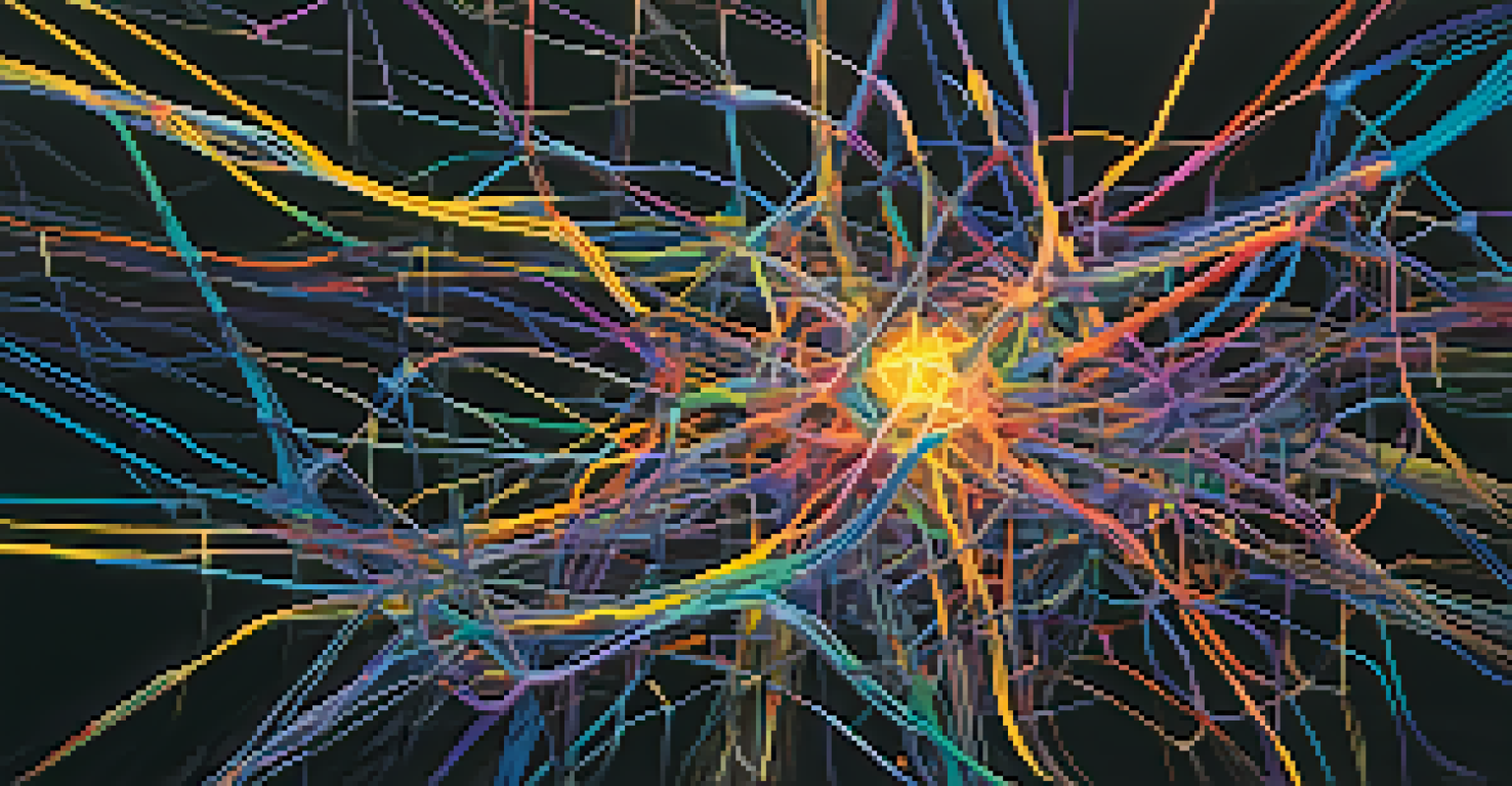AI-Powered Tools for Analyzing Hallucinogenic Effects and Data

Understanding Hallucinogenic Effects and Their Data
Hallucinogenic substances, like psilocybin and LSD, can profoundly alter perception, mood, and cognition. Understanding these effects can be complex, as they vary greatly from person to person. This variability is where data analysis comes into play; by gathering large datasets, researchers can identify patterns and commonalities in experiences.
The mind is everything. What you think you become.
The challenge lies in the sheer volume of subjective experiences that need to be analyzed. Traditional research methods can be slow and often miss nuanced details that could be crucial for understanding these substances. That's where AI-powered tools enter the picture, offering a modern solution to age-old questions about the mind and consciousness.
By employing machine learning and natural language processing, these tools can sift through vast amounts of qualitative data from surveys, interviews, or social media. This allows researchers to identify trends and correlations that might not be immediately visible, paving the way for deeper insights into the effects of hallucinogens.
The Role of AI in Data Collection and Analysis
AI tools can significantly enhance the data collection process through automation and smart algorithms. For instance, AI can analyze social media posts to gauge public sentiment and experiences regarding hallucinogenic substances. This capability not only saves time but also provides a broader perspective than traditional methods might offer.

Additionally, AI can help categorize and classify experiences based on various factors such as dosage, setting, and individual psychological profiles. This categorization is crucial for understanding how different variables influence the effects of hallucinogens. By organizing data effectively, researchers can make more informed conclusions.
AI Enhances Hallucinogen Research
AI tools streamline data collection and analysis, revealing patterns in subjective experiences related to hallucinogenic substances.
Furthermore, AI algorithms can continuously learn and adapt as more data becomes available. This means that the insights derived from these tools can evolve over time, becoming more accurate and refined with each new dataset. This adaptability is a game-changer in the field of psychedelic research.
Examples of AI Tools in Hallucinogenic Research
Several innovative AI tools are currently being utilized to study hallucinogenic effects. For example, sentiment analysis software can evaluate the emotional tone of user-generated content about their experiences. This tool provides researchers with a quantitative measure of subjective experiences, which can be invaluable when analyzing emotional responses.
Science is not only compatible with spirituality; it is a profound source of spirituality.
Another example is the use of machine learning algorithms to predict outcomes based on user data. Researchers can input various attributes—such as previous mental health history or environmental factors—and the AI can predict how likely a user is to have a positive or negative experience. This predictive capability can help in both research and therapeutic settings.
Additionally, data visualization tools powered by AI can present findings in an easily digestible format. By transforming complex datasets into visual representations, researchers can communicate their findings more effectively, making it easier for both the scientific community and the public to grasp the implications of their work.
Challenges in Utilizing AI for Hallucinogenic Data Analysis
While the potential of AI in analyzing hallucinogenic effects is promising, there are challenges to consider. One significant issue is the ethical implications of using AI in this sensitive area of research. Ensuring that data is collected and analyzed responsibly is crucial, especially when dealing with personal experiences that can be deeply impactful.
Another challenge is the accuracy of AI algorithms. Given the subjective nature of hallucinogenic experiences, training AI to understand context and nuance can be difficult. If the algorithm is not properly trained, it may misinterpret data or overlook important subtleties, leading to skewed results.
Ethical Challenges in Research
Ensuring ethical practices, such as informed consent and data privacy, is crucial when using AI in sensitive hallucinogenic research.
Lastly, there’s the question of accessibility. Not all researchers have access to advanced AI tools or the expertise to use them effectively. Bridging this gap is essential to ensure that the benefits of AI can be realized across the board, allowing for a more comprehensive understanding of hallucinogenic effects.
The Future of AI in Hallucinogenic Research
Looking ahead, the future of AI in hallucinogenic research appears bright. As technology continues to advance, we can expect more sophisticated tools that can analyze data with greater accuracy and efficiency. This evolution will likely lead to new discoveries about the therapeutic potential of hallucinogens, which could revolutionize mental health treatment.
Moreover, as public interest in psychedelics grows, more funding may be directed toward research initiatives. This increased support could lead to collaborations between tech companies and researchers, resulting in innovative solutions that push the boundaries of our understanding.
Finally, ongoing education and training will be essential to empower researchers to utilize AI effectively. By equipping scientists with the necessary skills to harness these tools, we can unlock new possibilities in the realm of psychedelic research, ultimately benefiting society as a whole.
Ethical Considerations in AI-Powered Research
Ethics play a crucial role in any research involving human experiences, especially with sensitive topics like hallucinogenic substances. Researchers must prioritize informed consent, ensuring that participants are aware of how their data will be used. This transparency fosters trust and encourages more individuals to share their experiences.
Moreover, researchers should be cautious about data privacy. With AI tools capable of processing large datasets, it’s vital to safeguard personal information to prevent misuse. Establishing robust data protection measures is essential to uphold ethical standards and maintain the integrity of research.
Future of AI in Mental Health
The integration of AI in psychedelic research promises new insights and potential therapeutic applications for mental health treatment.
Additionally, the interpretation of AI-generated insights must be handled carefully. Researchers should avoid over-relying on these tools and instead use them as complementary resources alongside traditional research methods. Striking this balance ensures that the human element of research remains at the forefront.
Conclusion: Embracing AI for Enhanced Understanding
In conclusion, AI-powered tools are transforming the way we analyze hallucinogenic effects and data. By harnessing the potential of these technologies, researchers can gain deeper insights into the complexities of human experiences with psychedelics. This evolution not only enhances our understanding but also opens the door to new therapeutic possibilities.
As we continue to explore the intersection of technology and psychology, it's essential to remain mindful of the ethical considerations that accompany this journey. By prioritizing responsible research practices, we can ensure that the benefits of AI are realized while respecting the experiences of individuals.

Ultimately, the combination of AI and psychedelic research holds the promise of unlocking new frontiers in mental health treatment and human understanding. By embracing these tools, we take a significant step forward in our quest to comprehend the intricate tapestry of human consciousness.